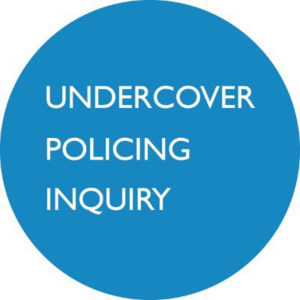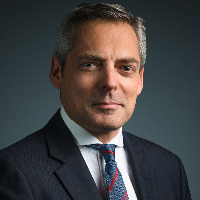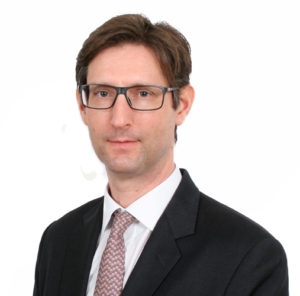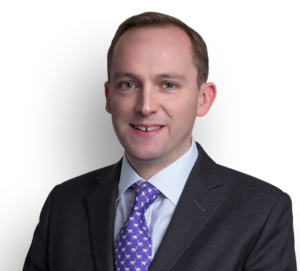UCPI Daily Report, 3 Nov 2020
 Tranche 1, Phase 1, Day 2
Tranche 1, Phase 1, Day 2
3 November 2020
Evidence from:
Peter Skelton QC (Metropolitan Police Service)
Gerry Boyle QC (National Police Chiefs’ Council)
Richard O’Brien (National Crime Agency)
Nicholas Griffin QC (Home Office)
Oliver Sanders QC (Designated Lawyer Officers, i.e. speaking for 114 spycops)
When the powerful are caught doing the unjustifiable, they follow the same sequence of responses:
– Ignore it
– Deny it
– Delay the reckoning
– Declare too much time has past, it’s a different era, we can’t do anything now
Today was a day of police lawyers’ opening statements at the Undercover Policing Inquiry. ‘What the spycops did may have been bad but it was a long time ago, lessons have been learned, it’s different now, nobody need lose their job or pension, move on,’ paraphrased over and over again.
The morning had representatives of four agencies basically saying what their agency does. It was like listening to someone reading Wikipedia. Nobody has ever relished hearing the word ‘ninthly’.
There was very little of relevance to the scandal of the political secret police, but lots of stuff about how other undercover work keeps us safe from paedophiles and terrorists, implying that spycops aren’t that bad in the greater scheme of things.
Peter Skelton QC (Metropolitan Police Service)

Peter Skelton QC
Skelton says the Metropolitan Police have ‘absolute commitment’ to the Inquiry, which is news to those of us who’ve seen their myriad delays and obstructions over the years.
He said the Met doesn’t seek to justify but to admit and improve; but undercover policing is important, though must be within legal and ethical boundaries.
He told us that substantial changes have already been made in law and in police structure. We were told this in the past about the Human Rights Act 1998 and Regulation of Investigatory Powers Act 2000, but the spycops units just ignored the rules.
Skelton assured us that sexual relationships while undercover are prohibited under new rules. However, the police have been very clear that this was always the case. Similarly, his saying that participation in criminal activity must be ‘necessary and proportionate’ is no comfort, as this too is a long-established and long-ignored standard. The problem is in who defines necessary and proportionate.
Skelton told the Inquiry that the Met is ‘aware of continuing anger and distress of victims of spycops’, though he stopped short of saying they were sorry. He mentioned spycops deceiving women into relationships and quoted at length from the 2015 Met apology to some of these women. He said the Met stands by the 2015 apology, despite the fact that it still won’t actually give any answers or let women see their files, and is still delaying settling civil claims by some of the women.
There was a concession from Skelton that the Met hadn’t cared about the families whose dead children’s identities had been stolen by spycops. This is ambiguous, as he may just mean when the practice was common up to the 1990s, or he could be including the Met’s more recent flat refusal to comply with government demands to tell affected families, waiting until the Inquiry decided to do it.
Spycops’ involvement in crime was downplayed as merely ‘joining in’, seemingly trying to deflect from the fact that they were agents provocateur and took instigating roles.
There ‘may’ be some deployments which were not justifiable, he told us, and cited the spying on Stephen Lawrence’s family. The Met ‘appreciates’ the length of time Stephen Lawrence’s loved ones have waited for answers – the Met has stonewalled them for decades – and Skelton said the Met is grateful for Duwayne Brooks and Doreen Lawrence’s work.
It wasn’t to be the last time this hearing that we were astonished at the gall of the police in talking about a justice campaign they spied on.
LONG AGO & FAR AWAY
Having admitted what is already well established, Skelton lauded the dedication, professionalism and bravery of undercover officers. With his gift for understatement, he described how the Met ‘hasn’t always understood’ how to support the spycops officers – while it basically pushed them into a PTSD generator. They knew full well it damaged officers, and they chewed them up and spat them out knowing there’d be more to replace them.
The SDS Tradecraft Manual from 1995 has a mocking section on dealing with post deployment anguish. Whistleblower officer Peter Francis asked for help, received none, and then sued the Met and received a settlement for his PTSD, 25 years ago. The SDS did not start to work on a welfare policy until the late 1990s.
Skelton moved into the ‘long time ago’ trope, saying policing now is unrecognisable from 1968. This ignores the fact that the spycops continued operating long after 1968, and their activities got more reprehensible as time went on.
There was emphasis on how undercover policing helps combat child abuse, human trafficking, modern slavery and more, so we should recognise the bravery of undercover officers, specifically including those who were in the spycops units that are the focus of the Inquiry.
Skelton treated us to a long ramble about the historic context of the period the Inquiry is about to examine, citing the advent of the pill, legalisation of abortion (as if that didn’t happen after a lot of campaigning and protest), and the assassination of Robert F Kennedy as if they had some relation to policing left-wing groups and peace campaigns in the UK.
He told us it was important not to judge the spycops of the past by modern standards. In doing so, he contradicted a point made yesterday by the Counsel to the Inquiry: he pointed out that in the early days of the SDS, the Home Secretary desperately feared embarrassment if the truth of the unit’s methods came out. This shows they knew it was very much against the morality of the time.
We were told that although some intelligence gathered by spycops may have been ‘retained unnecessarily’ by modern standards, it would have been hard for them to know what would turn out to be useful information until some time later, so gathering anything and everything was fair enough. While individuals named may not be bad, they may know people who are, so we can’t criticise spycops for targeting people and groups who were harmless. Apparently the Met ‘recognises’ the strength of anger felt by such targeted people.
US AGAINST THEM
After painting a picture of benign public servants vs dangerous activists, Peter Skelton QC claimed “a simplistic narrative of ‘us against them’ – whether malign spy vs innocent civilian, or benign public servant vs dangerous activist – does not do justice to anyone”. In doing so, he sidestepped the key factor of institutional power being on one side of those relationships. We’re not talking about a malign spy, but about a malign institution that trained people to act harmfully over a period of decades.
After Peter Skelton finished, the Chair, Sir John Mitting, asked if he was correct in inferring that the Met, and police generally, no longer regard it as part of their task to assist MI5 with investigation of subversion; that it is no longer viewed as part of the police’s role to infiltrate those ‘who would be regarded by the majority as politically extreme’; and that it is no longer part of the police’s task to infiltrate single issue campaigns which cause disruption, but not serious disorder of the kind caused in 1968. And, if this were true, when was that view formed, by whom, and for what reason? (is this an exact quote? Or can it be?)
Skelton had ten minutes to think about it and came back with a ‘neither confirm nor deny’ answer that wouldn’t comment on present arrangements..
Gerry Boyle QC (National Police Chiefs’ Council)

Gerry Boyle QC
Gerry Boyle explained what the National Police Chiefs’ Council is. The NPCC coordinates 43 police forces of England and Wales, doing what the Association of Chief Police Officers did until 2015. It doesn’t act for individual officers. It is involved in the Inquiry because it helps formulate policy and practice for undercover policing.
The NPCC is involved in the redaction of documents for the Inquiry, and has done risk assessments for spycops to see if they need anonymity at the Inquiry. It’s been liaison between the Inquiry and all English and Welsh forces except the Met.
The NPCC has these functions: coordination of national operations; command of counter terrorist policing; coordination of police response to national emergencies; implementing standards and policy as set by College of Policing and government.
It was the successor body to the Association of Chief Police Officers, which oversaw the later spycops unit, the National Public Order Intelligence Unit (NPOIU), from about 2006 until it was subsumed into Counter Terrorism Command in 2011.
In keeping with the pattern of the day, implying that spycops somehow deal with significant threats to life and limb, Boyle didn’t even leave it two minutes before mentioning terrorism.
Boyle said many NPOIU officers had experience of major investigations and usually returned to their original constabulary after their undercover deployments. Because they are more likely to have dealt with terrorism and organised crime than the SDS, more of them need anonymity at the Inquiry.
He went on to praise the role of undercover police in dealing with paedophilia and terrorist atrocities, giving detailed examples of these and other things that have nothing to do with spycops, a speech that only serves to insult spycops’ victims by association.
Undercover work has ‘not been without controversy’ but it’s all so much better now, he assured us.
Boyle laboriously listed all the regulations that govern and constrain undercover work, without reference to why they had been institutionally ignored by the spycops units. He said that inspections under the Regulation of Investigatory Powers Act 2000 ensured compliance with the rules, ignoring all the spycops’ outrages since 2000 that prove otherwise.
Richard O’Brien (National Crime Agency)
The National Crime Agency’s Richard O’Brien, like Gerry Boyle, spent time explaining what the agency he represents does. Once again, the state’s representative talked about undercover work against paedophiles and terrorism and used it as an implied excuse for what the spycops did.
O’Brien managed to say ‘serious and organised crime’ in three consecutive sentences. Shortly afterward he said it twice in a row, as the end of one sentence and the start of the next.
The NCA took over the role previously held by the National Crime Squad, and before that various regional crime squads. The NCA has a wider remit than its predecessors, combating organised crime, cyber crime, human trafficking and more. Undercover operations are key to all that the NCA does.
The NCA’s interest in the Inquiry isn’t due to having any relevant spycops itself – it didn’t even exist at the time the Inquiry is examining – and it doesn’t infiltrate political groups. It is in the Inquiry to learn, and is especially looking at the final Module where recommendations will be made for the future. It won’t really be involved in the first two modules as they look at historic issues.
O’Brien said he wasn’t not allowed to say much about what NCA does with undercover officers but it involves weapons and explosives dealers, human trafficking and paedophiles. He did not say why it was relevant to the spycops. There’s an implication that spycops were also involved in such things, therefore their targets were deserving victims, or if not then it was still a fair price to pay for protection against the serious and organised crime he described.
Nicholas Griffin QC (Home Office)

Nicholas Griffin QC
Griffin began by quoting then-Home Secretary Theresa May telling parliament in 2014 why the Inquiry is needed, which you can see at the start of this video on our YouTube channel.
He then explained that the Home Office is especially interested in role of undercover policing in protection from crime, and the legal and regulatory framework for it.
Although the Home Office directly funded the Special Demonstration Squad for its first 21 years, when Steven Taylor was commissioned to report on the link between the two institutions in 2014, he searched Home Office archives but failed to find a single document about it.
The Taylor report unsurprisingly found little evidence of any Home Secretary knowing about spycops, and no evidence of them having knowledge of the various outrages committed by officers.
Griffin said the Inquiry will bring further scrutiny of Home Office role, and they will cooperate.
Oliver Sanders QC (Designated Lawyer Officers)

Oliver Sanders QC
The final statement for the day came from Oliver Sanders QC, representing 114 mostly ex- (though some current) spycops. They are predominantly from the SDS, but some from the later NPOIU, and they include both undercover and back room staff. Some of them became managers later. In total, it’s around 60% of all SDS staff (around 70% of those still alive).
In contrast to Nicholas Griffin’s brevity, Sanders settled in for a long, repetitive speech. He spoke like someone who is paid by the hour at a very high rate, which is probably the truth of the matter. It was reminiscent of ‘Just A Minute‘, with no comic factor at all. Imagine ‘Just An Hour‘, and no other players.
Sanders basically had three demonstrably untrue points:
– police never intend to harm anyone
– spycops are better than the alternative
– even though they’re bad we can’t judge them because it was a long time ago
He just kept making them over and over with avalanches of pointless details.
Sanders said the SDS was just one cog in much larger machine of security and intelligence, established and overseen by central government, with the Home Office at the top. The Home Secretary sets functions for MI5 as well as overseeing police (the Met in particular). The Commissioner of Met is appointed on Home Secretary’s recommendation. The Home Office mandated Met Special Branch, of which the SDS was a sub-unit. As Nicholas Griffin had already said, the Home Office funded SDS from 1968 to 1989.
Like a droplet of oil hitting water, Sanders suddenly went wide on the philosophy, history and function of policing. The first duty of police and any police officer is keeping the Queen’s peace, he said. Public order is paramount, key to the functioning of a civilised society. Lord Scarman said maintaining normal society is the very function of police.
This became a motif, making a point then reiterating it, citing what he appeared to feel were impartial sources, who were all senior figures of State such as judges and senior ministers.
The right to protest is in conflict with a right to continuous calm, Sanders explained. Balance must be struck that allows protesters to do their thing without impacting on the majority. Cities don’t exist as blank canvases for protests to be imposed upon. As the police have to deal with many communities and keep the peace, they must have information about what’s going on. Hence intelligence units like the SDS who, unlike other police, don’t make arrests.
Sanders said the Met Special Branch existed mainly to provide public order intelligence to uniform branch, and intelligence on ‘subversives, terrorists and extremists’ to MI5.
So, he asserted with perhaps the most daring understatement of the day, the SDS was just doing normal Special Branch work but in a specialised way. This intelligence then helped police to ‘manage’ major public order events.
THE SOUND OF THE CROWD
Returning to the overarching theory of the role, Sanders told us that police are simply ordinary members of society undertaking public service. No matter the strength of one’s feeling, it doesn’t include the right to attack other citizens just because they’re in uniform.
But crowds can behave in ways that single members wouldn’t; in groups, people are more prone to volatility. Peaceable individuals you wouldn’t have thought worth spying on might decide to get rowdy. Protesters can enjoy the effect as disorder can demonstrate strength of feeling, create public alarm and political attention, and give the opportunity to provoke police in the hope the public will regard it as police brutality.
Public order situations were worsening in 1968 because there was a generation of young adults that hadn’t had a world war or national service, Sanders said with a straight face. In 1968, when the SDS was formed, such eruptions were coming from far left and anarchist organisations, rather than the far right, he claimed.
Sanders explained that most intelligence is necessarily acquired indiscriminately, and its value can only be appraised later on. He did not address the fact that he’d just made the argument for a complete surveillance state, without saying there should be any constraints.
This casual, chilling perspective was reinforced by saying that ‘the question is whether the ends justify the means, rather than judging the means on their own terms’, an excuse any torturer would be able to give.
THEN AND NOW
Like the Met’s representative Peter Skelton QC earlier in the day, Sanders cited the assassinations of Robert F Kennedy and Martin Luther King, then went on a long detour about life in 1968, telling us a pint of beer was 1 shilling and 2 pence, and there were only three TV channels.
So, of course, policing was different in 1968 too, they had whistles but no training on dealing in public disorder. Laws were different too so, again like Skelton, Sanders said we shouldn’t not judge the spycops by modern standards.
As he well knows, laws against identity theft and sexual assault were long established in 1968.
He said it was a tumultuous time compared to 2020, a conclusion nobody who’s lived through this year could draw with the slightest degree of honesty.
Comparisons with 1968 are a diversion – surely deliberate – to distract from the facts of the spycops’ abuses. The spycops are not an event in that year, that was merely the start of an institutional process that went on for decades and, crucially, got worse as time went on. The spycops in 2010 – long after the supposed new regulatory framework of the Human Rights Act, etc – were, if anything, committing even worse abuses than their 1968 counterparts.
Sanders then went on to explain that spycops weren’t really that bad, as worse policing was possible. He conjured scenarios of water cannons and baton rounds being used because spycops hadn’t collected advance intelligence and warned the uniformed police that a protest might end in trouble.
He justified spying on all manner of groups, because you never knew who’d become worth spying on, or which insignificant group would splinter into one they wanted to monitor, or which group would attract members of target groups. He mentioned members of the Communist Party of Great Britain and Socialist Workers Party joining CND with the aim of ‘taking it over’. He said that Rock Against Racism and others were worthy targets because they were just fronts for the SWP.
These groups had a right to pursue their beliefs, he insisted, but police just wanted to understand what was going on in order to create threat assessments. Sinn Fein made Marxist statements, drawing support from far left groups of interest. Advocating the end of internment without trial was lawful, he acknowledged (ignoring the fact that the internment was itself a violation of human rights).
After 1968 demonstrations increased in number, scale and intensity, he said.
MAKING A KILLING
He then made perhaps the most shocking assertion of the day. Oliver Sanders had the gall to list injuries at protests in the 1970s and singled out the deaths of Kevin Gately and Blair Peach, two men who were killed by police.
Gately was on an anti-fascist demonstration, the organisers of which included the Communist Party of Great Britain, the International Marxist Group, and the International Socialists, three groups Sanders himself cited as main targets for spycops.
Peach was in the Socialist Workers Party, the spycops’ most targeted organisation; there can be no claim that he might have lived if only the spycops had been more involved. The officer who killed Peach has been identified, but was never charged. Peach’s partner, Celia Stubbs, ran a justice campaign after his death which was targeted by spycops. She is a core participant at the Inquiry.
Sanders had been rattling on about the need to use police resources efficiently, yet spycops expended huge resources to undermine dozens of justice campaigns like Blair Peach’s. Resources that should have been spent catching killers were used to obstruct justice.
For Sanders to use the death of Blair Peach this way shows foul and venomous contempt for Blair, Celia, and everyone else involved in groups targeted by spycops.
HOW THE SDS FUNCTIONED
Sanders then spoke a little about the SDS’ internal organisation. The SDS had a back office for organisation, and two safe flats in changing locations where back office and undercovers could meet. Around 10-12 officers deployed at a time in far left, anarchist, Irish and far right groups.
Officers in this period (1968-82) would spend some months in the back office preparing their legend and learning about their targets, arranging cover accommodation and vehicle. Once undercover, they would have twice-weekly meetings in safe flat and daily phone calls. The average deployment in the earlier days was 3-4 years.
The SDS’ roles were intelligence gathering, and counter subversion work for MI5. While it monitored a large number of groups, a much smaller number were actively infiltrated.
Sanders insisted they had to report on ‘softer outer circles’, and at times when little was happening, in order to be in place for more serious events. Some campaigns come up without warning in response to events, so they wanted spycops to be in place already. By its nature this meant infiltrating groups that didn’t seem to be worth it.
Intelligence was recorded in reports then catalogued. As hard copy reporting was slow in the days before electronic communications, much of what the SDS did was face to face or on the phone, rather than written. And much of what was written wasn’t retained. The extant files are a fraction of what was made.
A lot of SDS reports have been retrieved for the Inquiry from copies sent to MI5. However, officers remember certain reports that haven’t been found. It may just be they weren’t sent to MI5, or not retained. MI5 had a big subversion clear-out in the 1980s. Sanders explained that this is nothing untoward, no blame to anyone, it’s just the nature of what happens with documents from so long ago.
Sanders emphatically asserted that there is no basis for the suggestions of deliberate shredding of older SDS files to destroy incriminating evidence. Surely spycops would never do such a thing.
Sanders’ opening statement is on the Inquiry site.
Sanders will complete his opening statement on Wednesday morning, covering the functioning of the SDS itself and its operational contribution to public order and counter subversion.
COPS will be live-tweeting all the Inquiry hearings, and producing daily reports like this one for the blog. They will be indexed on our UCPI Public Inquiry page.
